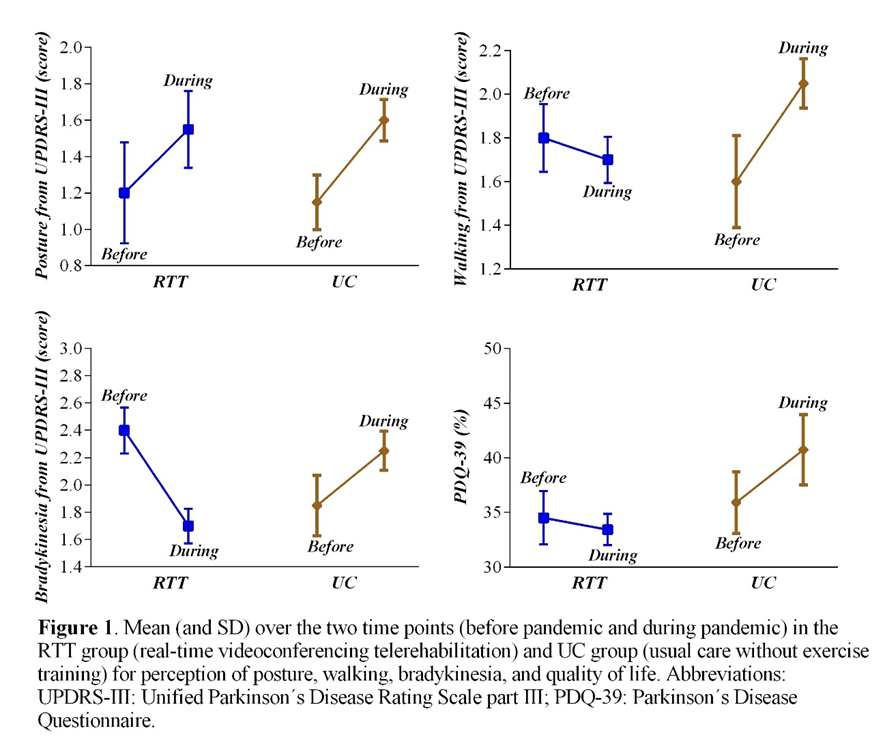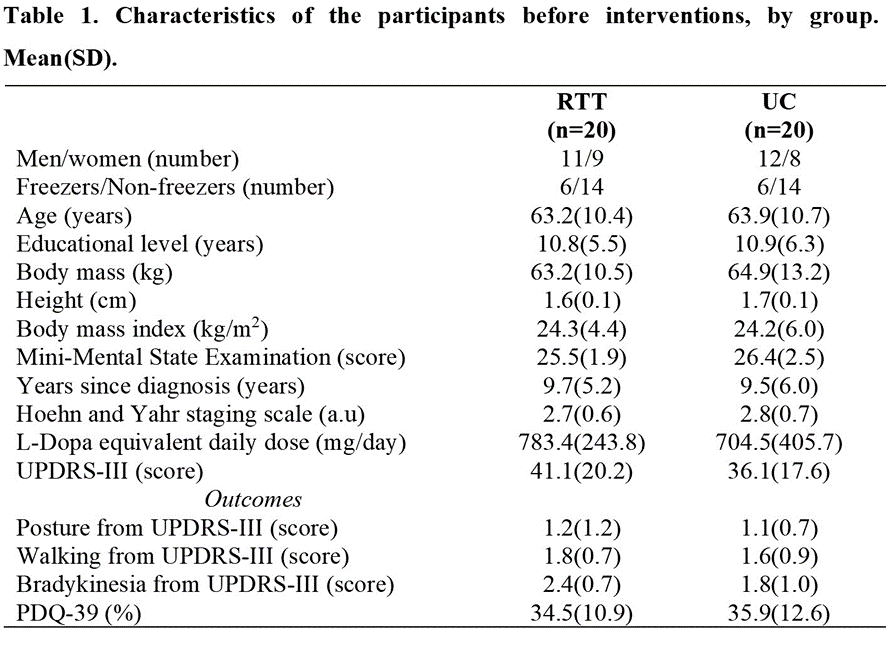Category: Allied Healthcare Professionals
Objective: To compare retrospectively the effects of 10 months of supervised, home-based, real-time videoconferencing telerehabilitation (RTT) and usual care without exercise training (UC) on self-reported posture, walking, bradykinesia, and quality of life in individuals with Parkinson’s disease (PD).
Background: Clinical worsening in the PD motor symptoms has been observed during the COVID-19 pandemic.1 RTT has been recommended to mitigate the self-reported clinical worsening in people with PD in a safe way,2 as people are able to access remote rehabilitation services in their own homes.2 However, if long-term RTT can mitigate self-reported clinical worsening in PD is still unclear.
Method: People with PD from Brazil Parkinson Association and from the Movement Disorders Clinic in the School of Medicine at the University of São Paulo who performed either RTT (n=20) or UC (n=20) were retrospectively assessed before pandemic (February to March 2020) and during pandemic (February 2021). People with PD participated in 60 min, group (8 per group) exercise sessions 2-3 days per week for 10 months (April 2020 to January 2021). Exercises included: dual tasking, gait training, lunges, dance, balance training and functional skill training. Items from UPDRS-III (posture, walking, and bradykinesia) and PD Questionnaire (PDQ-39) scores were assessed before and during pandemic by blinded evaluators. Effect size (ES) and Confidence Interval (CI) were calculated for within-group (before vs. during) and between-groups (during) comparisons.
Results: There were no between-group differences in any variable before pandemic [table 1]. ES and CI for within-group comparison showed that RTT improves perception of bradykinesia, preserves perception of walking and quality of life and worsens perception of posture. In addition, UC worsens perception in all variables [figure 1]. ES and CI for between-group comparison showed that RTT is more effective than UC in preserving perception of walking, bradykinesia, and quality of life [table 2].
Conclusion: Supervised, long-term RTT at home improves perception in bradykinesia and preserves perception of walking and quality of life, although RTT worsens perception of posture, which is linked to fall in people with PD.
References: 1 Papa SM, Brundin P, Fung VSC, et al. Impact of the COVID-19 Pandemic on Parkinson’s Disease and Movement Disorders. Movement disorders: official journal of the Movement Disorder Society 2020;35(5):711-715. 2 Gandolfi M, Geroin C, Dimitrova E, et al. Virtual Reality Telerehabilitation for Postural Instability in Parkinson’s Disease: A Multicenter, Single-Blind, Randomized, Controlled Trial. Biomed Res Int. 2017. https://doi.org/10.1155/2017/7962826
To cite this abstract in AMA style:
E. Tardelli, E. Okamoto, F. Almeida, AM. Neto, E. Barbosa, C. Batista. Supervised, home-based, real-time videoconferencing telerehabilitation preserves perception of some clinical aspects in people with Parkinson’s disease: preliminary data of a retrospective study [abstract]. Mov Disord. 2021; 36 (suppl 1). https://www.mdsabstracts.org/abstract/supervised-home-based-real-time-videoconferencing-telerehabilitation-preserves-perception-of-some-clinical-aspects-in-people-with-parkinsons-disease-preliminary-data-of-a-retrospective-stu/. Accessed February 14, 2026.« Back to MDS Virtual Congress 2021
MDS Abstracts - https://www.mdsabstracts.org/abstract/supervised-home-based-real-time-videoconferencing-telerehabilitation-preserves-perception-of-some-clinical-aspects-in-people-with-parkinsons-disease-preliminary-data-of-a-retrospective-stu/



